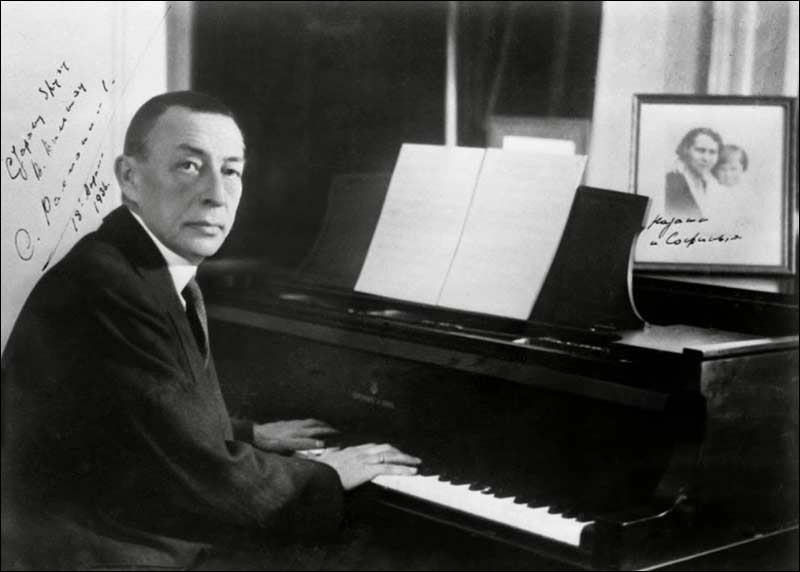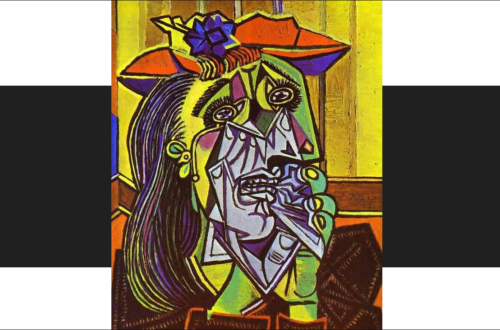As a young composer, Sergei Rachmaninoff had his first major piece (his First Symphony in D Minor) performed in 1897. It did not go well. Music critic César Antonovich Cui savaged it in a Russian newspaper:
If there were a conservatory in Hell, and if one of its talented students were to compose a programme symphony based on the story of the Ten Plagues of Egypt, and if he were to compose a symphony like Mr. Rachmaninoff’s, then he would have fulfilled his task brilliantly and would delight the inhabitants of Hell. To us this music leaves an evil impression with its broken rhythms, obscurity and vagueness of form, meaningless repetition of the same short tricks, the nasal sound of the orchestra, the strained crash of the brass, and above all its sickly perverse harmonization and quasi-melodic outlines, the complete absence of simplicity and naturalness, the complete absence of themes.
This negative response had much to do with political rivalries between St. Petersberg composers, which Cui belonged to, and those like Rachmaninoff from Moscow. There were larger politics at play not having much to do with Rachmaninoff or his First Symphony. The symphony was also supposedly played very poorly at its premiere due to under rehearsal. But no matter. The damage seems to have been done. Rachmaninoff himself said that he did not mind the vicious newspaper attacks on his symphony, but the evidence suggests otherwise: he subsequently suffered a mental collapse and lost his inspiration for making music. Rachmaninoff thought of giving up composing entirely and did not publish a piece again until 1899. Friends had him go to a hypnotist who supposedly helped him to move on, and then he published his famous Second Piano Concerto, premiered in 1900. Rachmaninoff’s career was back on track, and the rest is history.
But why such a hostile review by César Cui on Rachmaninoff’s First Symphony? Music conceived in “Hell”? Really? Why the vituperative tone?
I am not a huge fan of that piece, but what of it? Even if that symphony is a “failure,” it was the first by Rachmaninoff and much better were to come. “Failure is success in progress,” claimed Albert Einstein. But his Symphony Number 1, could Rachmaninoff have written Variation on a Theme by Paganini or his “Rach 3”? I wish I could go back in time and tell Rachmaninoff to ignore utterly Cui’s negative review. Just move on to your next musical project. I would tell Rachmaninoff he was well on his way towards his artistic goals. Stay the course. A century later I await his music. I believe in him, and he should believe in himself.
Artists, and all of us really, need fewer critics and more fans. We need less criticism and more support. We would do better with more cheerleaders and fewer back bench complainers. Constructive criticism is helpful, perhaps indispensable. But encouragement and applause is the stuff that will help artists to find their way. For example, is this apocryphal portrayal of one of the earliest art critics helpful? Is the criticism “constructive”?
I sometimes wonder at the intemperate attacks on artists — or anyone in the public eye, really — by their critics. I wonder if the attacks have more to do with the unhappiness of the critic rather than the quality of the art or the person in question. Unhappy people bringing their unhappiness to others.
Last week I was driving when I came to a stoplight. I braked to a stop behind a blue Miata that did not have a rear windshield. The young lady behind the wheel turned full around and stared me right in the eye for about five seconds. My mind having been somewhere else, I stared right back at her. I thought perhaps she had been a student of mine, as the only women I know in their mid twenties are former students. “Do I know you? Were you a student of mine? Should I recognize you?” I struggled to place a name to the face. Then she turned around, the light turned green, and she drove quickly away. Later I thought about this weird scene and wondered if she had turned around and stared at me because she was angry with me. Did she think I had stopped too close to her car? Was she angry? Was she “mad dogging” me? I would have picked that up quickly from a man, but not so much with a woman. I have no idea who this young lady was. I am not sure exactly what happened.
And last Sunday at my daughter’s soccer game a pair of fathers from the other team’s sideline grew enraged with the referee and yelled so much and so aggressively at them that tournament officials were summoned. The referees talked with the other team’s coach. They told them if these dads did not calm down, they would be ordered to leave; and if they did not leave, the team would be disqualified from the tournament. The sullen fathers quieted down, with tournament officials standing by babysitting them for the rest of the game. I was a bit shocked by the violent tone of the screaming from these fathers. They lost their cool at their daughter’s youth soccer game and screamed at an old man who was a volunteer referee. “What is wrong with you?” I thought. The aggressive tone — the edge to their voices — was disquieting. These kinds of men, I reflected, get the cops called on them. They are known to the police and the courts. Judges order them to anger management counseling. A wise person avoids these kinds of men, if at all possible. An unfortunate person has one for a father or a husband.
I have heard that parents losing their cool is common at amateur sporting events, and even assaulting the officials or the other team. Even killing them. I am not surprised.
But, more to the point, the lady in blue Miata and these men at the soccer game are most likely angry about other things in their lives which lead them to lose their cool on the road or at a soccer game. They are angry, angry, angry. So that deep-set anger seeps into the other areas of their life. They get “triggered.” It is not really about braking too close to a vehicle or the quality of refereeing at a soccer game. There are other problems. Other issues. Or maybe they are just angry people, period. Assholes. Who knows?
My point is that in the world you will encounter people who attack or criticize you. They will find fault. They will say horrible things about you and your work. They will grow red in the face and say it is all your fault. They will impugn your character. And if you listen too much to them, past a point, it can prompt a crisis of identity. As with Sergei Rachmaninoff, it can cause your morale to plummet. Self-doubt, never far away, is all over you. It overshadows your better impulses. As with Rachmaninoff, it can cause a crisis.
Avoid all this, gentle reader. When you hear the howls of the critics, give them a moment’s notice. Give it a fair hearing. Self-reflect. Then move on briskly. There are still those who criticize Rachmaninoff for being “too schmaltzy” — for making music better suited for movie soundtracks than for serious music lovers. It is too sugary sweet. Saccharine. I totally disagree (although they may have a minor point). We can agree to disagree, and they have a right to their opinion. I remember hearing on the radio that Tchaikovsky supposedly criticized himself, “I always can tell where my seams come apart in the hems of my music.” Really, Tchaikovsky? Self doubt? Even in you? In his best moments, Tchaikovsky is just about the most perfect artist I know. If even he suffers from self-doubt, what hope is there for us?
Young man, young lady, listen to me a minute. Hearken to that inner light that leads you to seek for the truth, I tell you. Remember back to that artistic vision that led you to your work. That impulse is what led you to create, and that impulse is vital, is good, is true. The opinions of others are not so important. They are just that — opinions. Stay true to yourself. Don’t lose sight of your inner light. Pointing always to the North Star, stay true to yourself.
Some people like Rachmaninoff’s music, some don’t. In my last posting, I talked about how I am not a big opera fan (link). Others are. That is fine. Some people like filet mignon, others like caesar salads. Some like Pepsi, others Coke. Some are conservatives, others liberals. Don’t take disagreement or criticism too personally. Maybe it is more about them than you. It probably is. A matter of personal taste and temperament.
Just put in the serious, unending work of practicing your art and being yourself. You don’t owe anyone an apology, and you have a right to be you. Let criticism wash off you like water off a duck’s back. Just like Wendell Berry argues in this poem —
“Do Not Be Ashamed!”
by Wendell Berry
Berry is right. “It is only candor that is aloof from them / only an inward clarity, unashamed, / that they cannot reach.” I love that last line by Berry —
“The heron will begin
his evening flight from the hilltop.”
But sometimes it can’t be avoided. You cannot avoid getting mixed up in the muddle of the world. “I ask you to judge me by the enemies I have made,” claimed Franklin Roosevelt. I have one better: avoid controversy, refuse polemic, step away from a fight, if you can. Make as few “enemies” as possible! Winston Churchill once supposedly said, “You have enemies. Good. That means you stood up for something, sometime in your life.” True enough! But too often engaging your “enemies” leads to endless disputation. It leads to further ill will, and it ends with enormous energy squandered. Abraham Lincoln wrote the following to army officer James M. Cutts who was court martialed for excessive quarreling with other officers:
“The advice of a father to his son “Beware of entrance to a quarrel, but being in, bear it that the opposed may beware of thee,” is good, and yet not the best. Quarrel not at all. No man resolved to make the most of himself, can spare time for personal contention. Still less can he afford to take all the consequences, including the vitiating of his temper, and the loss of self-control. Yield large things to which you can show no more than equal right; and yield lesser ones, though clearly your own.”
I agree with Lincoln. Time spent fighting with your enemies is time wasted. Avoid the urge to engage outward in negativity about what you are against and instead move inward with positivity towards what you are for. If your light is bright enough, and if constant nurturance helps it to burn brighter and brighter, nobody will remember the critics or their darkness. Someone 100 years from now is cheering for you, and urging you to ignore the critics.
Time has a way of settling accounts. History has forgotten César Antonovich Cui. It remembers Sergei Rachmaninoff. People strain to recall George McClellan. They remember Abraham Lincoln. Take note.
And if you avoid combatants, avoid engaging others in combat. When two tigers clash, the Chinese claim, one is killed and the other maimed. Is the victory worth the injury? And blowing out someone else’s candle won’t make yours shine brighter.
Go forth, then, and pursue your path in peace. Live with pleasure and purpose. You will encounter many who are lost and full of rage, but that is not you. The North Star always shines, even when clouds obscure it from view. When you can’t see it, the North Star is there. And if you know where it is in the skies, you should never be lost for long. Be patient and have faith and the clouds will part. There again is the North Star. It is always there to guide you.
Amen.

“DESIDERATA”
Max Ehrmann
Go placidly amid the noise and haste, and remember what peace there may be in silence.
As far as possible, without surrender, be on good terms with all persons.
Speak your truth quietly and clearly; and listen to others,
even to the dull and ignorant; they too have their story.
Avoid loud and aggressive persons, they are vexations to the spirit.
If you compare yourself with others, you may become vain and bitter,
for always there will be greater and lesser persons than yourself.
Enjoy your achievements as well as your plans.
Keep interested in your own career, however humble;
it is a real possession in the changing fortunes of time.
Exercise caution in your business affairs, for the world is full of trickery.
But let this not blind you to what virtue there is;
many persons strive for high ideals,
and everywhere life is full of heroism.
Be yourself. Especially do not feign affection. Neither be cynical about love;
for in the face of all aridity and disenchantment it is as perennial as the grass.
Take kindly the counsel of the years, gracefully surrendering the things of youth.
Nurture strength of spirit to shield you in sudden misfortune.
But do not distress yourself with dark imaginings.
Many fears are born of fatigue and loneliness.
Beyond a wholesome discipline, be gentle with yourself.
You are a child of the universe no less than the trees and the stars;
you have a right to be here. And whether or not it is clear to you,
no doubt the universe is unfolding as it should.
Therefore be at peace with God, whatever you conceive Him to be.
And whatever your labors and aspirations, in the noisy confusion of life,
keep peace with your soul. With all its sham, drudgery and broken dreams,
it is still a beautiful world. Be cheerful. Strive to be happy.





